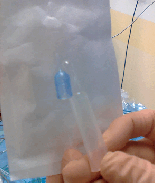Foveal contrast sensitivity affected by glaucoma

Foveal contrast sensitivity affected by glaucoma by Matt Young EyeWorld Contributing Editor Could contrast sensitivity testing help detect glaucoma earlier? A scene as it might be viewed by a person with glaucoma. A new study found that central vision is significantly decreased by the disease Source: National Eye Institute, In contrast to conventional wisdom, new research finds that sharp central vision is significantly decreased by glaucoma. The research, published in January in Archives of Ophthalmology, found significantly lower foveal contrast sensitivity in both photopic and mesopic conditions in eyes with glaucoma. “The maintenance of good visual acuity until late in the disease and the absence of characteristic central visual field defects lead to the belief that the fovea remains unaffected in the early stages of the disease,” reported co-lead study author Hani Levkovitch-Verbin, M.D., Goldschleger Eye Institute, Sheba Medical Center, Tel-Hashomer, Israel. “Ho...

